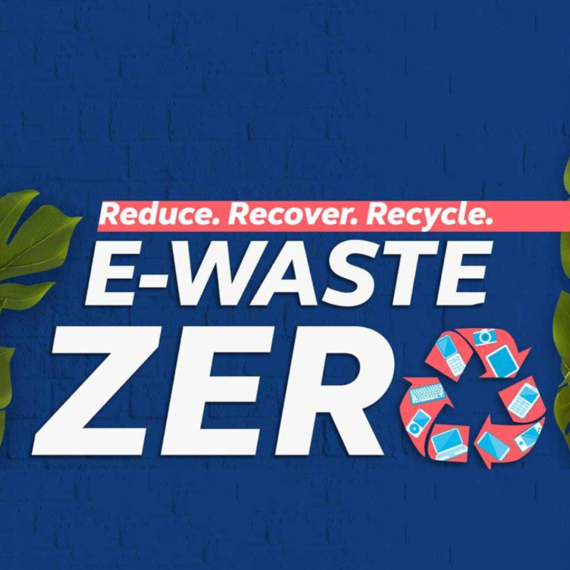
Benefits of Implementing a Zero E-Waste Policy in Your Business
How much electronic waste does your business generate each year? Are you aware of the environmental impact this e-waste has on our planet? According to the Global E-waste Monitor 2020, 53.6 million metric tons of electronic waste were generated worldwide in 2019. This amount is projected to rise to 74 million metric tons by 2030. This growing e-waste crisis poses significant environmental and health risks, making it imperative for businesses to adopt sustainable practices. One practical approach is implementing a zero e-waste policy. This blog explores the numerous benefits of such a policy, demonstrating how it can enhance your business operations and promote a healthier planet.
Power Up Your Business and the Planet: Benefits of a Zero E-Waste Policy-
1. Protecting the Environment by Reducing Hazardous Waste
The primary benefit of a zero-e-waste policy is its positive impact on the environment. E-waste consists of dangerous materials such as lead, mercury, and cadmium, which can contaminate water and soil if improperly disposed of. By committing to zero e-waste, businesses can ensure that these harmful substances are kept out of landfills and the natural environment.
2. Conserving Natural Resources
Recycling and reusing electronic components reduce the need for raw materials and greenhouse gas emissions associated with manufacturing new products. This conservation effort helps preserve natural resources, including precious metals like palladium, gold, and silver, which are commonly used in electronic devices. By minimizing the extraction of these materials, your business contributes to less environmental degradation and promotes sustainability.
3. Achieving Significant Cost Savings Through Efficient Resource Management

Adopting a zero e-waste policy can lead to significant cost savings for businesses. Instead of discarding old electronics, companies can refurbish and reuse them, reducing the need for frequent purchases of new equipment. Additionally, recycling programs often offer financial incentives for businesses that recycle their e-waste. By taking advantage of these programs, organizations can offset the costs associated with upgrading their technology. Moreover, implementing energy-efficient practices alongside e-waste reduction can lead to lower energy bills, further enhancing savings.
4. Ensuring Compliance with E-Waste Disposal Regulations
E-waste disposal is subject to various local, national, and international regulations. Businesses that do not follow these regulations are fined and face legal issues. Implementing a zero e-waste policy ensures compliance with laws and regulations, avoiding potential legal troubles. Staying compliant protects your company from fines and shows your commitment to responsible and ethical business conduct.
5. Enhanced Corporate Reputation with Sustainable Practices
Builds a Positive Brand Image: Adopting a zero electronic waste policy shows that your business cares about the environment. This commitment to sustainability can enhance your brand’s reputation. Customers and clients are more likely to support companies that are environmentally responsible.
Attracts Eco-Conscious Consumers: More and more consumers are making shopping decisions based on a company’s environmental practices. By implementing this policy, you can attract and retain eco-conscious customers who prefer to do business with environmentally friendly companies.
Improves Stakeholder Relations: Stakeholders, including investors, employees, and partners, appreciate businesses that prioritize sustainability. Therefore, its implementation can improve relationships with these groups by fostering trust and loyalty.
6. Driving Innovation and Gaining a Competitive Advantage
Implementing a zero e-waste policy encourages innovation and creativity within your organization. To achieve zero e-waste, businesses must explore new technologies and processes for recycling, repurposing, and reducing electronic waste. This drive for innovation can lead to the development of cutting-edge solutions and practices that give your company a competitive edge. By staying aware of industry trends and embracing sustainable practices, your business can position itself as a leader in environmental responsibility.
7. Promoting Public Health by Reducing Exposure to Toxic Substances
E-waste contains toxic substances that can harm human health if improperly managed. Exposure to these life-taking materials can lead to serious health issues, including respiratory problems, neurological damage, and cancer. By implementing a zero-waste policy, businesses can help protect public health by ensuring that electronic waste is disposed of safely and responsibly. This commitment to health and safety can resonate with employees, customers, and the broader community.
Getting Started with a Zero E-Waste Policy
Implementing a zero electronic waste policy is a step-by-step process. Start by conducting an e-waste audit to assess your electronic equipment and identify areas for improvement. Develop clear guidelines for responsible e-waste management, including proper equipment use, maintenance, and disposal procedures—partner with certified e-waste recyclers like REECOLLABB to ensure environmentally sound practices.
By embracing this policy, your business can reap significant financial and environmental benefits. Promoting a sustainable future for your company and the planet is a win-win situation. So, take the first step today and power down your e-waste footprint!
Read Our More Blogs:
How Smart Home Technology Contributes to E-Waste?
Best Practices for Storing and Transporting E-Waste For Recycling
Follow us:







